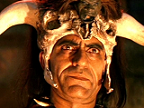|
Mr.Morgenstern posted:So how did you guys like those last two lessons? What lesson should I do next? Really digging them, it really helps to have a context for a region and period that most people are ignorant about. I'd suggest a lesson about the geography of the region, because it is equally unfamiliar, and it can be kind of confusing to see all these foreign names for places.and have no idea where they are relative to each other apart from the map screenshots or their real importance other than being a place, I must even shamefully admit I probably didn't recognize anything other than "Kabul" or "Hindus" as geographic references thus far. It is one of the big challenges of presenting a narrative outside of Europe and the Middle East, since most westerners can recognize some major cities from said areas, but it can get confusing when you are in that nebulous area between Delhi and Tehran. It doesn't help being inland, as the terrain in political map mode isn't very expressive and, at least for me, there isn't much more than the Hindus river to put things relative to each other, but again, that might just be my own ignorance speaking. Keep on the good show!
|
|
|
|

|
| # ? May 7, 2024 21:57 |
|
Loving the history lessons as well, very fascinating and as stated, this is a rather uncovered portion of history and geography. History as a joint to LP is always a nice gem [reminds me of Geop's Assassin's Creed LPs].
|
|
|
|
Our guy started out Hindu; is there enough information to write about Hinduism in Afghanistan?
|
|
|
|
I'm really digging the lessons as well. Possibly something about political hierarchies in the region to go along with the geography? I.e., a what is the difference between a shah and a satrap, and the various other names for polities we've seen here and there.
|
|
|
|
In Crusader Kings II, Satrap and Shah are just the Iranian culture group names for Duke and King, respectively. Shahzada is prince. Emperor becomes Shahanshah, meaning "King of Kings" and was the traditional title of the Persian Emperor. Marzoban is count, but I can't find any more information beyond that. From my research, (which could be wrong), Satrap was not used in the times of CKII, but Paradox needed an Iranian name for duke. Historically, Satrap was the title given to a governor who ruled provinces in the Median, Achaemenid (what most people think of when they hear "Persian Empire"), Hellenistic (successor kingdoms of Alex the Great), and Sassanian (last Persian empire before the Islamic conquest) empires. Basically from 678 BC to 651 AD. Toningly, there isn't as much information about Hinduism and Afghanistan as there is on Buddhism. Historians speculate there have been Hindus there since the Indus Valley Civilization (3300-1300 BC), but beyond that, we don't know much. The latter Kabul Shahis were Hindu, like the monarch Hafez overthrew. Like the Buddhists, Hinduism suffered greatly under the Muslim conquests and they mostly vanished. I think a lesson on geography would be good for the next lesson. Anyways, the update. Note: some of these pictures took place during the last war, but I didn't use them because it didn't make sense for Hafez to hunt critters while his entire nation is under threat. Chapter Five: The White Tiger  With the Saffarids defeated, Hafez's mind turns to domestic matters. He has heard rumors of a strange tiger that roams the landscape. Obviously, the only proper response is to kill it and hang its fur on his wall.  Fortunately for Hafez, the tiger is spotted nearby his own capital. It's time for killing.  However, the white tiger is nowhere to be found, but the exercise is good for Hafez anyways.  Eventually, Hafez calls off the hunt. He will catch it one day.  When he hears of another sighting, he sets off again for the beast, but finds no trace of it. Hafez now must swallow his pride.  A week later, another of Hafez's sons comes of age. Kambiz is a fine warrior and an acceptable diplomat, but he isn't good for much else. He is betrothed to a young Pala princess.  While on another hunt, Hafez gathers his sons and shows them the sword he planted when Kabulistan was lost. Hafez elaborates that whoever possesses this sword shall be lord of the Pashtuns when Hafez dies. With those words, he hands the sword to Zahak.  Hafez's wound finally heals, adding another scar to his sizable collection.  I'm putting this picture because I just what to show off what a badass Hafez is now.  Gholam is upset about losing the main inheritance, but Hafez gives him the position of Grand Vizier as a consolation prize.  Defying tribal custom, which states the inheritance shall be divided among all the sons, Hafez declares that Zahak shall have all of Hafez's land.  With the white tiger evading Hafez, he decides to hunt some ordinary tigers instead.  Yet they prove to be just as elusive as the white tiger. Hafez gnashes his teeth and returns to his normal business.  But the hunts have not been fruitless. They put energy into Hafez in his old age, and he loves nothing more than to run with his dog.  He continues to route more authority through himself.  There are a few Thakurs that refuse the Shah of Punjab's authority. Hafez begins to rectify the situation.  To Hafez's great surprise, the Followers of Arjuna join the Thakurani's cause against him. He was not aware that the FoA considered him a heathen. But they do, and Hafez calls in the Chosen of Ashoka to aid him.  The Grandmaster of the FoA himself is among the prisoners. Hafez ransoms him and lets him go.  With no way to defend herself, the Thakurani submits.  Kasmira is by right the property of Emira Kishan of the Gandhara Satrapy. As a favor to Kishan, Hafez brings in his army to subjugate it.  During the short war, Hafez learns that he is now a grandfather. Zahak has named the child after him, in hopes that the child will inherit his strength.  The only difficult part of the war is catching the opposing army. The enemy would rather run than face Hafez.  Like before, the Thakurani submits.  Back at the palace, Hafez looks through his realm's financial records. Some of the numbers don't match up and Hafez worries that his friend Sina is behind it.  Fortunately, Sina has done no such thing and Hafez is glad to know that some people can always be counted on.  In the wake of the last Saffarid-Nagar war, several of the counts escaped the control of the Saffarids. One of these is Marzoban Hurmiz, the last Zunbil ruler. Hafez eyes him for his next conquest. There are actually a few Zunbils in the Satrap of Zabulistan's court in the 867 start.  But instead Hafez attacks another Thakur, this one an old man.  Another son comes of age. Humayun is another great warrior and would be greater still if he had his left arm.   The war revives Hafez's love of battle and warfare. It's a shame that the war is so short.  But sadly, on the way home, Hunter falls ill. For several days he clings to life before letting go. In the middle of the night, when no one is watching, Hafez buries him in the castle garden.  Sobered, Hafez begins to prepare for the wars his sons will no doubt be a part of. He orders the construction of new walls in Multan and several other of his provinces.  Now it is time for the Zunbil to submit. We're using the Buddhist holy war, which is more like a Muslim county conquest than a regular holy war. We only get one province for it and we don't kick the infidels when we win.  As Hafez marches through the valleys, he is reminded of his old village, which had been destroyed by Muslim raiders long ago. He had lived among the Nagars for a short while, before traveling to Kabulistan to make his fortune. How things have changed. It turns out the Nagars are an actual clan, but they are not a Pashtun clan, but a Gujar clan. The Gujars are an ethnic group in Pakistan and western India, but a few live in Afghanistan.  Regardless, the Marzoban surrenders after a short fight.  Ruling so much of the land of the Pashtuns, Hafez becomes known to his Muslim neighbors as the Shah of the Afghans, Afghan being what they call the Pashtuns in their native tongue.  Hafez hears more tales of the white tiger, and immediately sets off to find it.  But Hafez learns something very interesting. The stories of the white tiger came about a merchant who overheard some Saffarid soldiers talking about the White Tiger of Punjab. This story spread from person to person, changing each time until it came to Hafez. But the White Tiger in the original telling was a not a feline of any sort, but the ruler of Punjab, known for his white beard. Hafez was the White Tiger all along. No wonder he couldn't find it.  But before he can share this discovery, Hafez drops dead. Zahak is now Shah. Will he lead the Pashtuns to greater glory? Or will his reign be one of disaster?
|
|
|
|
What are your crown laws looking like?
|
|
|
|
At the time of Zahak's ascendency they are both at Low.
|
|
|
|
Hafez was a nice, auspicious start. All hail the Shah!
|
|
|
|
I loved that ending to the white tiger story.
|
|
|
|
Hitlers Gay Secret posted:I loved that ending to the white tiger story. That was a pretty great little bit of flavour. I also found the scarred, old notoriously brutal warrior king quietly burying his loyal dog at night to be kind of poignant.
|
|
|
|
Frontspac posted:That was a pretty great little bit of flavour. Both those things owned.
|
|
|
|
Chapter Six: Making Love AND War Zahak is in many ways similar to his father when he took the throne. A great warrior, an able administrator and schemer, and a poor diplomat and scholar. Like his father, he seeks to make a name for himself in history. Also, while Hafez became a devout Buddhist, Zahak became a Hindu at the age of 18, on the grounds that the Hindu priestesses were more attractive than the Buddhist nuns.  There's just one major difference. Whereas Hafez worked continually on his bladework and archery, Zahak spends his time performing a different kind of swordplay.  As a matter of fact his first act upon becoming Shah is to focus his attention on seducing one of his vassals. This does not bode well for the realm. It also doesn't help that Zahak does not have a way with words.  Believing the emira to be a naive romantic, Zahak corners her after midnight in the kitchen, rips off his shirt, and confesses his love for her.  Stunned, Kishan backs away, mutters something about needing a snack, and walks out. While Zahak feels like a moron, he refuses to give up.  Later, after a drunken night with a cute girl he met at a feast, Zahak discovers he's just been made part of a local Kali cult.  Zahak tries anther tact with Kishan, this time dressed like this:  and singing the hit song "I Enjoy Large Posteriors, I Cannot Dispute, You Other Fellows Cannot Refute".  Not sure whether to be impressed or disturbed, Kishan gives Zahak a shot because a) he's the Shah and b) he's built like a warhorse.  No sooner has Zahak slept with Kishan that he focuses his attention on another woman.  But before he can get around to that, his generals advise him to attack Shah Layth while he is involved with a rebellion. Remembering that he was supposed to accomplish great deeds as a Shah, Zahak readies the armies and declares war on Layth.  Perhaps it's due to his own infidelity, but Zahak grows more and more insecure about his wife's faithfulness. But as he thinks about it, his wife would never cheat on a bronzed god like him, right? Right?  Word spreads that Zahak's half brother Humayun is gathering an army abroad to take his throne. Humayun is a capable man and he hasn't let missing an arm stop him from achieving anything.  It turns out that Zahak's affair with Kishan was a bit more fruitful than he expected. She gives birth to a baby girl, who despite her resemblance to Zahak arouses no suspicion from Satrap Tej Bhan.  Rumors of the feud between Humayun - but just rumors - are now spreading throughout the kingdom. Humayun knows now that Zahak would like nothing more than to plaster his brain across the floor. But Humayun hasn't come this far to give up.  One of Zahak's lovers sends him a gift to help him with his war, telling her husband that she's just paying for the new garden.  As Zahak marches across the Afghan mountains, he starts to lose his courage. There are so many pretty girls to chase before he dies! What if he loses his arm or something more valuable in the fighting?  News that Zahak is waging war against Muslims starts a riot in Kafirkot, drawing Muslims from around the country.  Emira Kishan catches pneumonia while Zahak is away and dies. While there was never much between the two besides sex, Kishan was fairly loyal to Zahak, and her passing means that one more supporter is dead.  Having been called in to join in Zahak's conquest of Zabulistan, his allies also suppress the rebellion for him.  While the army is busy fighting the Saffarids, Humayun makes his move and rallies his supporters in Multan. Four thousand men besiege the tiny garrison left behind at the capital.  Zahak is beginning to panic. He's fighting one of the most powerful blocs in the world and his own brother is attacking the homefront. He cannot die now. With this in mind, Zahak begins to stick to the back of the army.  Assured that the Saffarid front will be secured by his allies, Zahak marches all the back to Multan, only to find that Humayun has seized the capital and declared himself Shah. Against his will, Zahak finds himself at the front of battle. At the opposite end is his brother, who has prepared for this day.  Through a series of wacky shenanigans and mishaps, Zahak's attempts to flee to the back lines result in him routing an entire regiment by himself and slaying over thirty enemy soldiers with a helmet. His accidental heroics fire up his men and rout the entire enemy army.  When the dust settles, Zahak orders his men to search the dead. Among the lifeless bodies is the corpse of his brother, Humayun. With their leader dead, the rebels either flee or surrender.  Shortly afterwords, the Kosala Maharaja sends the leader of the Sunni revolt to Zahak in chains. The revolt is over.  Zahak returns to the Saffarid front. At this point he's seen enough of the Aghan mountains to last him a lifetime.  Still dealing with the revolt, Layth surrenders Zabulistan to Zahak in order to concentrate his forces more effectively.  With this great victory, Zahak is now at a loss as to what to do. What now?  That's right, sleeping with various women who aren't his wife.  Anokhi is quite flattered to receive the attention of the great (unintentional) warrior king. Zahak leaves her an anonymous note on her bedstead the next morning, telling her that it was nice but nothing more and she shouldn't expect any favors.  At the very least she keeps the affair secret.  One day, as Zahak goes about the business of running the realm, he receives word of a massive diamond. After arriving at the mine, he finds that the diamond is indeed quite large. In fact, it's the largest diamond he's ever seen by a long shot. Knowing that the ladies love jewelry (at least the noblewomen do), he orders that it be worked into his new crown.  He also orders the construction of a new keep at Kafirkot for the protection of the diamond.  The diamond is truly the blingiest of bling.  A little too blingly, as the brightness causes an elephant to stumble about and step on his foot.  As more and more accidents pile up, Zahak decides to sell the thing.  But he misses its comforting glow. Late at night, he orders several of his personal guard to track down the merchant he sold it to and get it back at all costs.  While the merchant was killed, the important thing was that they got the diamond back. Zahak begins to call the diamond "His precious".  The diamond goes missing and Zahak accuses the first person he comes across of stealing it - in this case his brother Hormoz. Hormoz denies taking the diamond and no one can find it.  The unruly Muslims once again rebel, after several imams claim that Zahak is possessed by the jinn and must be overthrown.  With a real problem to deal with, Zahak snaps out of his funk and sends his army to crush the rebels.  The rebels are quickly put down.  Zahak's son Hafez comes of age. He is a fine warrior, but nowhere near the warrior his grandfather was. He is quickly married to a Pratihara princess.  So with all these problems, is Zahak ready to turn a new leaf in regards to his womanizing ways? Of course not. Mr.Morgenstern fucked around with this message at 00:54 on Jan 14, 2015 |
|
|
|
Zahak's a real character, isn't he? Is that diamond event chain new in WoL? I've never seen it before, and it rules.
|
|
|
|
It's been around since Rajas of India, and it's available to nations with their capital in de jure India. It's based on the Hope Diamond.
Mr.Morgenstern fucked around with this message at 01:18 on Jan 14, 2015 |
|
|
|
CK2 does do its best to destroy the most promising kings, doesn't it?
|
|
|
|
Lord Cyrahzax posted:CK2 does do its best to destroy the most promising kings, doesn't it? That it does. Just so you guys know, the update after the next update will be the State of the World in 917. I'm just going to say that already things are deviating from the way things normally go in CKII. Hello indepedent and powerful Great Moravia.
|
|
|
|
Wait, why was there an option to give it to Zahak's husband? 
|
|
|
|
malkav11 posted:Wait, why was there an option to give it to Zahak's husband? It's a localization error. It's a bit common among the Rajas of India events, IIRC.
|
|
|
|
malkav11 posted:Wait, why was there an option to give it to Zahak's husband? Zahak is so incredibly manly and attractive that even men want to sleep with him.
|
|
|
|
Chapter Seven: Kali Ma! Zahak continues to chase after the women in his kingdom, much to the anger of his wife.  His first attempt at seducing Bhani goes well...   ...but his latter attempts do not.   It's not til he meets her in person at a party that he finally succeeds.  This had nothing to do with his subsequent illness. Not at all. So get that notion out of your head.  It is at this point that Zahak begins openly having affairs. Soon he always has a small company of young women accompanying him.  He leaves many noblemen furious, but he is the Shah, and they can do nothing.  He also has the audacity to ask his vassals that they give even more authority to him.  Some say the gods grew angry with Zahak, and struck him with pneumonia.  If that was the case, the gods were schizophrenic, as they allowed the vassals to go through with Zahak's ambitions.  AND they cured him of his pneumonia.  Zahak's second son comes of age soon after. Unlike his father, he knows nothing of warfare and has more confidence than ability.  Zahak returns to one of his old conquests in hopes of seducing her again.  At this point the clergy are quite upset with Zahak's womanizing. Zahak can't go to a festival without one of them preaching about the need for faithfulness toward one's spouse. Zahak responds by "accidentally" desecrating a temple of Shiva.  Amro is not happy to see Zahak again after he left her last time.  Even Zahak's own concubine tries to kill him.  Eventually, Amro gives in to Zahak's advances and the two reminisce about old times - physically.  Furious as his wife and the clergy are, Zahak has grown quite famous for his... promiscuity,  He also recruits an intelligent young maid with fine tracts of land to act as his spy.  As he grows in confidence, Zahak doesn't even try to cover up his sexual escapades.  As the years go by and Zahak's ,ahem, conquests grow, there's one girl in particular he remembers (except for her name). She was a poet and a devotee of Kali. She was also quite attractive. Hafez was never one for attending the Indian festivals, being a Pashtun through and through. But this girl convinced Zahak to hold a Kali Puja, a special festival held in honor of Kali. My research indicates that the Kali Puja was not practiced during Medieval times and it's first mentioned in the late 17th century. But I'm going with this for the sake of the LP.  Zahak, in accordance with tradition, got his wife a gift. It was probably the nicest thing he got her.  The clergy, as always, were wary of Zahak and refused to come.  He spent an entire year's income on the food and decorations. Nobles from all over his kingdom arrived at the feast. Even some neighboring Pratiharas showed up.  Zahak's wife was satisfied with her present, though to be fair her expectations of Zahak were rather low.  It was a rather spooky feast, all things considered, but the poetess was quite insistent on the decorations. She also suggested something else: sacrifice.  Drunk and seeking to impress her, Zahak ordered that a Muslim rebel be sacrificed to Kali.  Everyone who was sober enough to remember it wishes they weren't.  After the feast, the poetess and Zahak had a wild night outdoors. Even hungover the next day, Zahak felt it was worth it.  That incident is fresh in the minds of the noblemen as they plot a way to get rid of Zahak. Zahak has just begun to make advances toward the wife of the Bhatti Raja.  While no one can prove the two had an affair, the Bhatti Raja and his conspirators strongly suspect the two of the act.  Zahak's letter to one of the local noblewomen is intercepted. Copying the seal, the conspirators fabricate a declaration of war upon the Pratihara Maharaja. Zahak is in for a nasty surprise the next morning.
|
|
|
|
Shame the new patch update lowers the AI seducing others now. Also adding chances of getting caught during a seduction I guess.
|
|
|
|
This LP has totally sold me on picking up Way of Life and spending more time with CKII. I love that you can totally ignore conquest and dynastic politics in favor of playing Leisure Breeches Larry. Also at this point I think Zahak has so many mistresses and bastard offspring he might give even Dongu Ogoonu a run for his money.
|
|
|
|
I think "Vedi, Vici, Veni" might be my new favorite decision text
|
|
|
|
 Uh, great feast, guys? Guys? Uh, great feast, guys? Guys?
|
|
|
|
beefart posted:I think "Vedi, Vici, Veni" might be my new favorite decision text "Vedi, Vici, Veni." might be more accurate in this case. Fixed. Punnery in dead languages is hard. VVV Pinback fucked around with this message at 03:25 on Jan 15, 2015 |
|
|
|
Veni, Vedi, Vici is I Came, I Saw, I Conquered. Thus Vedi, Vici, Veni would be I Saw, I Conquered, I Came which is of course a prune or play on words because sex.  Vici Veni Vedi would be I Conquered, I Came, I Saw which doesn't make any sense.
|
|
|
|
Mr.Morgenstern posted:I'm playing the current version, but I've never had problems with the levy bug. There's been plenty of AI wars going on. The levy bug doesn't happen every time someone goes to war so an ai kingdom could go to war a couple times before being unable to disband some of its levies due to the bug. The bug can also cause vassals to rebel (because of the 'raised levy' opinion malus) causing more wars. The fact that this mostly seems to effect the AI hardest is why the bug was so hard to report for the longest time and I don't think it'd be absurd to suggest the bug is effecting your LP in ways you just haven't observed. I'd suggest updating to the next patch that fixes that bug as soon as possible, if you haven't already.
|
|
|
|
I've got the patch and yes it did affect the game in very small ways. However, this might have not on the whole been a bad thing, as it allowed certain states to survive longer than it did. And yes, I got the patch.
|
|
|
|
Rincewind posted:
You act like you've never seen a Kali Puja State of the World, 918 As the war between the Nagars and the Pratihara begins to unfold, it is time we looked at the other nations of the world. But first, we should see our neighbors.  The Pratiharas are a centuries-old dynasty, known as the "doorkeepers". Until the Nagars came, they defended India against Muslim invasion. Even now they are staunch allies whenever the Muslims are involved.  However, their kingdom is beginning to split, as various sons leave to make their own realms.  The Palas are the defenders of the Buddha, holding sway over all of eastern India. Their monarch, Vijaysen, is a fun-loving and just man, but an open skeptic of the Middle Way.  To their north is the Mlechchha kingdom, ruled by one of the worst rulers in India. Arbitrary, cowardly, and deceitful, Vigramhastambha is unlikely to make a name for himself in the history books.  The Jain Rashtrakutas control most of southern India. Jagattunda, the Maharaja, spends most of his days arguing with Jain ascetics.  The Lambakannas control Sri Lanka. Kassapa is a renowned scholar-king, and his treatises on religion, skepticism, and agnosticism are well-known throughout the subcontinent.  The Saffarids have been dealt some serious blows, but they are far from finished. Even so, Shah Layth consoles himself about his defeat by gorging himself on all kinds of food.  But no one is more concerned about the defeat of the Saffarids than the Caliph himself, Al-Mu'tazz. While at the beginning of his reign he was a lousy ruler, years of experience have toughened the old man.  The Tulunids are growing more and more decadent by the day. That said, they are slowing encroaching on their African neighbors.  Perhaps one of the more strange realms around, Duke Avag ve Sruk is the Paulician ruler of Edessa. Worried constantly about the threat of invasion, he distracts himself by throwing continuous parties.  Heir to a dynasty so old no one knows where they came from, Bagrat Bagrationi rules over much of the Caucasus. While a brilliant schemer, his other kingly attributes are lacking and an assassination attempt has sent him into hiding.  The last Jewish ruler in the world, Tarkhan is a man without friends or allies. He dreams of retaking his grandfather's kingdom, but neither he or his descendents are unlikely to do so.  The Samanids have allied themselves recently with the Saffarids in hopes of containing the Nagar menace - or rather that they get a slice of the pie if the Saffarids begin to push back the Nagars.   The Yabguids control a large swathe of the steppes, but how long can peace last between the brother chieftains?  Once vassals of the Khazars, the Pechenegs have carved out a nice kingdom for themselves out of the remains of their former liege. Kourkoutai, their chief, is a great warrior, but he is well-known for making sure he has time for his family.  Once the Rurikids ruled Russia. Now the Mordvin Meryavids rule. Viryay has only recently overthrown the previous monarch, but now seeks to create a great trade empire.  Into Rova of Suomi has done what many thought impossible - he has united the Finnish tribes under one banner. Frankly, it's a miracle he did it, seeing as he is a cowardly and lazy man.  Dyre the Stranger once dreamed of ruling all of the Kieven Rus. That never came to pass, but his dynasty will have to do with ruling Sweden and terrorizing Europe.  Halfdan Yngling, the Kinslayer, rules over Norway. Like his neighbor, he also enjoys terrorizing Europe.  Having converted to Christianity for fear of the Scots, Sigfrop - Sigfrob - (why did Paradox have to include the Norse alphabet  Wulf of Wessex is one of the two major powers in England.  The other being Aelfweard of Mercia. Either of these men could unite the Saxons under one banner.  High Chief Mugron of Mide has taken control of most of Ireland. Even now he prepares for war against the Chief of Breifne.  But there is no man mightier in the Isles than Radulf de Andrews, known as either "the Liberator" or "the Viking-Slayer". When the Danes conquered Albany, it was Radulf who rallied his countrymen and drove them out. It was he that sent the Jorviks cowering back into York. It was he that forced the Ivarings to undergo baptism on pain of death. He even usurped the crown from the Mac Ailpins. His realm is the one realm the Vikings avoid.   Asturias and the Umayyads continue to stare each other down.  Karlings!  Once the terror of the Carpathian basin, the Magyars have calmed down and joined the Catholic church.  Great Moravia has not only survived the Magyar invasion, but thrived, acting as a bulwark against pagan hordes.  The only great pagan kingdom to border Christendom, Pomerania's future is uncertain. But what is certain is that its people are strong and willing to fight.  Between Rus and Pomerania is a mess of various tribes, all fighting over whatever scrap of land they can find.  The Idrisid Sultan is not having a good day. Forced to cower in a remote corner of Africa, he's being pushed around by Mali. Mali.  Seriously.  The Aghlabids rule over the northern coast of Africa and even cling to Sicily. However, despite the efforts of the Sultan to clean up his dynasty, it is growing more and more decadent.  King Bekele has done much to unite the Miaphysite under one king. He even dreams of overthrowing the Tulunids and establishing an Abyssinian empire. But across the Red Sea, the Hashimids look hungrily at his land.  Bassilia Apollonia rules over the Eastern Roman Empire. She considers herself a warrior queen, but has yet to fight any battles.  King Mikica is a fine ruler, but his kingdom is in a not-so-fine state, as rebellious noblemen seek to restore their old rights. Nearly all of these kingdoms care little for the faraway kingdom of the Nagars. Yet if the Nagars were to expand to the point where they'd be a threat, it would be too late for these kingdoms. Mr.Morgenstern fucked around with this message at 07:55 on Jan 15, 2015 |
|
|
|
That is some quality Karlings going on in europe
|
|
|
|
What's that little mask icon Bagrat has? (Can you tell I haven't played in CK2 in a while?)
|
|
|
|
It means he's in hiding - it's harder for people to assassinate him, but it lowers his vassals' opinions and his prestige. He also needs a regent while he hides. Basically, someone's trying to kill him and he's desperate to escape. It's one of the features added in Charlemagne.
Mr.Morgenstern fucked around with this message at 08:20 on Jan 15, 2015 |
|
|
|
beefart posted:I think "Vedi, Vici, Veni" might be my new favorite decision text Oh my god. How did they get away with that?
|
|
|
|
Hell yeah. Don't die.
|
|
|
|
Jesus Christ, that loving world map. The descendents of Dyre rule Sweden? Rurik lost Russia? Catholic Ivaring Kings of Denmark? Viking slayer Scotland is pretty loving cool, though. Here's to hoping Pomerania survives the Karling bob, or that Republican Russia becomes a thing.
|
|
|
|
Chapter Eight: The Loins Sleep Tonight When Zahak's scouts came back with news of a Pratihara army assembling at the border, Zahak took a few moments to process what they had just said. His response is now famous across the Indian subcontinent. It has been translated various ways, but the most accurate translation is "Holy s***". He quickly gathers up the realms' defenses and hires the Rajput band to aid him. While outnumbered, his use of the native terrain turns the odds in his favor.  While he is victorious, his armies are in no shape to pursue the retreating Pratiharas and move back to Multan to recuperate.  The Pratiharas attack again, but once again the terrain conspires against them.  Unfortunately, Zahak's funds run out and the Rajput Company takes their leave of his service.  Even worse, the Notani Raj to the south declares war on him.  With both of these in mind, Zahak quickly arranges a truce with the Pratiharas.  While the Pashtuns have long tolerated the growing power of the crown, with the nation under threat, the Punjabis now relinquish some of their privileges.  In his old age and focused on the war, Zahak loses his enthusiasm for partying with the fairer sex.  The Kosalas come to the Nagars' aid and the two families make short work of the Notani Raj.  While Zahak besieges the enemy fortresses, he makes a commitment to spend more time with his wife and family when he gets back.  He sends a letter back home to his chancellor, asking him to send away the concubines. Zahak's going to repair his relationship with his wife.  Having taught the Raja a lesson, Zahak takes a small reparations payment in exchange for peace.  But filled with the old Nagar bloodlust, Zahak plans retribution on the Notani Raj. No one declares war on the Nagars and gets away with it.  Layth immediately calls in the Samanids to aid him.  Not only that, but the Caliph, concerned about the expansion of the Nagar Shahdom, sends his armies east against the Afghans.  However, the desert heat and the efforts of Pashtun guerillas take their toll on the enemy armies.  A few months later, over half the Abbasid forces have either died or deserted.  The Abbasid commander, desperate for some kind of victory, charges right into the Nagar forces. It is here that the Abbasids are slaughtered...  ...and descendents of the Prophet himself are captured.  But the long marches, heat, and battle wounds have taken their toll on Zahak.  Fearing his time has come to an end, Zahak makes his son Hafez regent.  Regardless, Layth's forces have been decimated, and he relinquishes his territory in India.  As Zahak's influence wanes, his mother starts lashing at his wife. Zahak stands up for his wife, as part of his ongoing campaign to make up with her. His mother could not be more upset with him.  Zahak's condition worsens and his son Hafez dies.  A month later, Zahak finally slips into a coma.  Who else should take control over the realm but his mother, who he insulted a while ago?  The regent before her, Behrouz, retaliates by sabotaging the levy recruitment in Multan.  Zahak's wife falls prey to demons.  And his mother dies of old age.  And then the Sunnis revolt again.  Fortunately, the revolt is crushed.  But his new regent takes advantage of Zahak's coma to make himself the ruler of Kafirkot.  Efser, the heir and regent, punishes the ex-regent's greed by arresting him.  At long last, Zahak's spirit leaves his body and is at peace. Now Efser must rule the kingdom. But Efser is an administrator, not a warrior. Will he be able to lead the Pashtuns to victory? Or will he lead them to ruin?
|
|
|
|
He's called Sigfroth. Sigfrop would just be silly. Edit: Argh. Ghostwoods fucked around with this message at 00:46 on Jan 16, 2015 |
|
|
|
|
|
|
|
A few things: 1. The Indian religions get their holy orders from the word go - and the Hindu holy order is massive for the early game. 2. I use the terrain to best of my ability. Forcing the enemy to attack across a river or while you're in the mountains or jungle can turn poor odds into a victory. 3. Both Hafez and Zahak were excellent generals. High martial means positive traits are more effective and negative traits have less of an impact. Zahak may have be a Craven, but his high martial (21) neutralized it completely. Additionally, simply having high martial increases the damage your troops do to the enemy. This is why Efser's relatively low martial is worrying. He has 7 martial when his cowardly father had 21 and his grandfather had at least 25. 4. Hindus - if the game is correct - have an additional 30% more morale. This means we can take a lot more punishment. And remember, I did not win the war with the Pratiharas - I just managed to white peace it before they started to push back. Mr.Morgenstern fucked around with this message at 02:15 on Jan 16, 2015 |
|
|
|

|
| # ? May 7, 2024 21:57 |
|
Ghostwoods posted:He's called Sigfroth. Sigfrop would just be silly. I would have thought the Anglicization would be Sigfrod but then again I have no idea how half the Norse alphabet is pronounced.
|
|
|



















